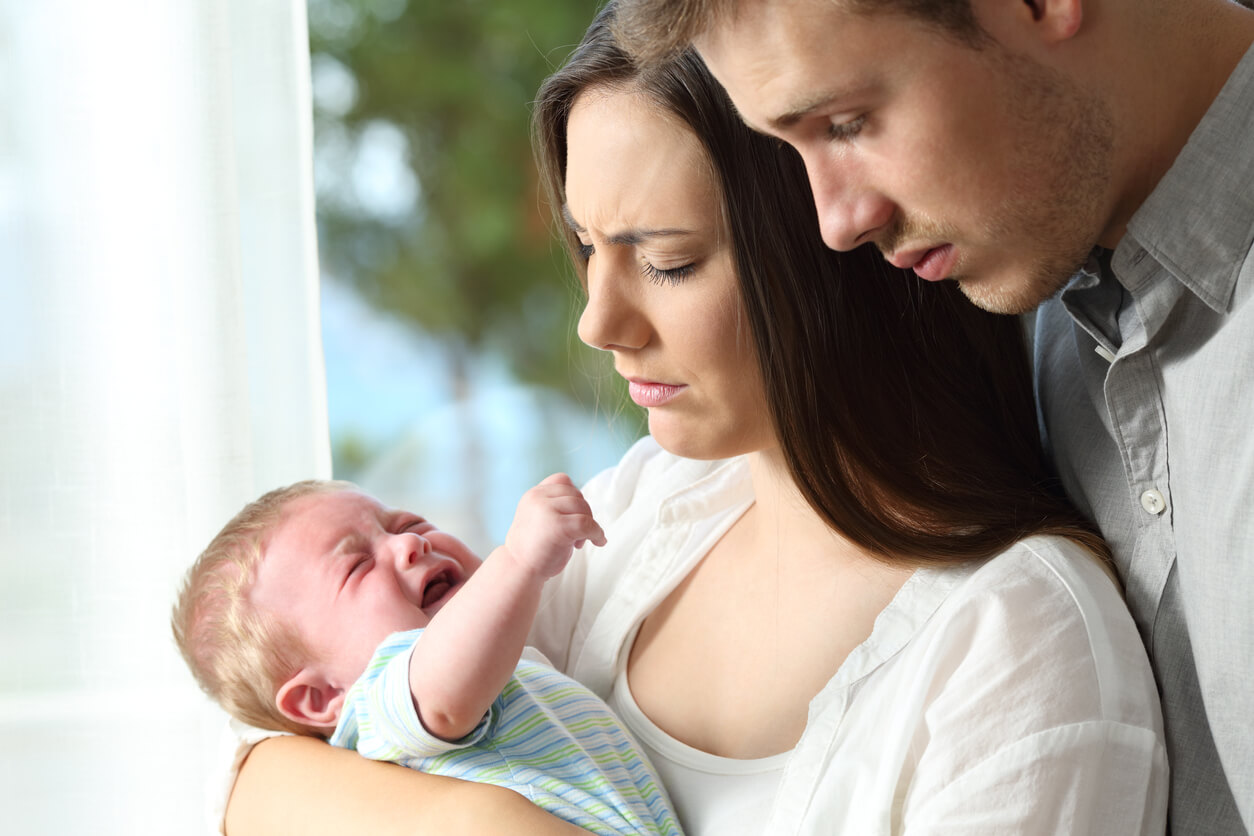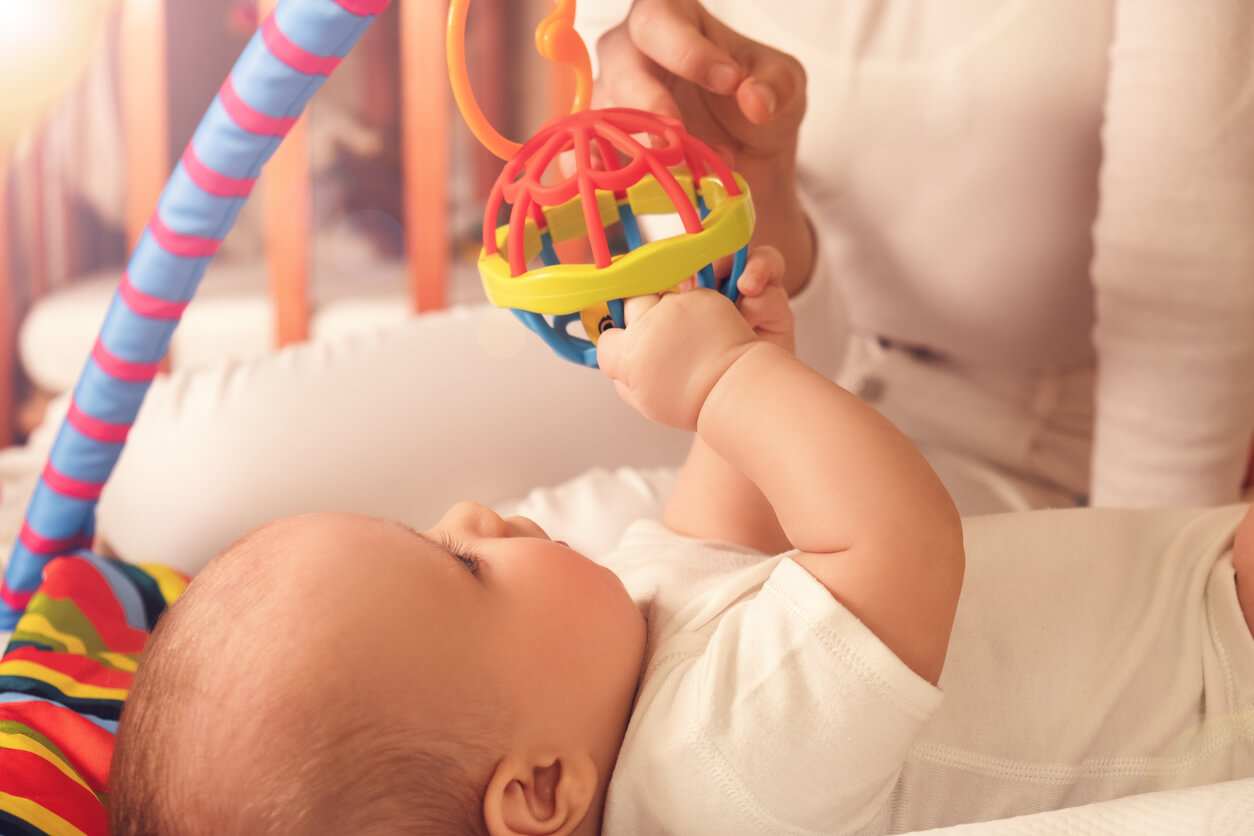The Psychological Behavior of a Newborn


Written and verified by the psychologist Mara Amor López
Although it may seem that newborn babies only sleep, eat, and soil their diapers, their brain never stops working, even when they sleep. The psychological behavior of a newborn does nothing but advance and develop every day, and there are many changes taking place in their mind.
Little by little, little ones make progress in different areas and, among them, in their cognitive growth. This allows them to learn, think, and remember. In addition, every time their parents interact in a positive way, their psychological behavior progresses. In this article, we’re going to tell you about the psychological behavior of a newborn so that you can understand how their mind never stops for a single day. Children’s brains are a marvel!
The newborn’s brain never stops working
The first weeks of a newborn’s life become a never-ending cycle: Diapers, sleeping, crying, eating, soiling, wetting, repeat. During this stage, the face and voice of their parents become the only sources of comfort they recognize. In addition, there comes a time when they associate their mother with calm, warmth, and nourishment.
When we rock, sing, caress, or talk to our newborns, we relieve any discomfort they’re experiencing. It could be gas, hunger, feeling sick, or the need to be close to their mother. This closeness to their parents, both emotional and physical, makes it easier for them to evolve and for their brain to develop.

The first form of communication
Crying is part of the psychological behavior of a newborn. With it, they let us know that something’s wrong or that there is something they need. Later, their communication will also include other sounds such as cries, grunts, sighs, or babbling.
Little ones can also communicate with gestures or through movements to get our attention. It’s important for parents to know their baby and to be able to recognize what exactly is wrong with them just by observing them and listening to their type of crying. In general, there comes a time when, instinctively, most parents are able to realize what’s going on.
The psychological behavior of a newborn: What should we take into account?
We mustn’t forget that, in order to stimulate the growth and brain development of a newborn, it’s necessary that this is in a cheerful, calm, loving, and stimulating environment. All this will favor the development of sight, hearing, and touch.
Babies also respond to the sounds they hear around them that attract their attention. For example, they may respond with a change in their activity, such as stopping moving their arms or legs to listen better or turning their head towards the source of the sound to see where it’s coming from.
From the second month of life, you’ll notice a change in your baby. At this stage, they’re much more receptive, they’re alert to everything that’s happening around them, and when spoken to, they seem to listen. Soon, they’ll start to make babbling sounds and, in the meantime, you can keep talking to them to stimulate their brain activity. From now on, the baby will advance by leaps and bounds and will amaze you every day with their amazing development.

Regarding the psychological behavior of a newborn, we can say…
As you’ve seen in this article, a baby not only soils diapers, sleeps, and nurses, but their psychological development goes much further than that. From the time they’re born, their brain doesn’t stop making progress and, from two months onwards, this happens more rapidly. We mustn’t forget that a newborn’s brain needs to be stimulated to increase their mental development. All the progress made from the first moment will be positive in the future.
Parents can help in this stimulation through the presentation of objects and sounds. This way, their brain will never stop working and this will help them learn new things every day. So, don’t underestimate the potential of your baby and think that they don’t know anything, because their brain doesn’t stop acquiring information to learn and develop every day.
Although it may seem that newborn babies only sleep, eat, and soil their diapers, their brain never stops working, even when they sleep. The psychological behavior of a newborn does nothing but advance and develop every day, and there are many changes taking place in their mind.
Little by little, little ones make progress in different areas and, among them, in their cognitive growth. This allows them to learn, think, and remember. In addition, every time their parents interact in a positive way, their psychological behavior progresses. In this article, we’re going to tell you about the psychological behavior of a newborn so that you can understand how their mind never stops for a single day. Children’s brains are a marvel!
The newborn’s brain never stops working
The first weeks of a newborn’s life become a never-ending cycle: Diapers, sleeping, crying, eating, soiling, wetting, repeat. During this stage, the face and voice of their parents become the only sources of comfort they recognize. In addition, there comes a time when they associate their mother with calm, warmth, and nourishment.
When we rock, sing, caress, or talk to our newborns, we relieve any discomfort they’re experiencing. It could be gas, hunger, feeling sick, or the need to be close to their mother. This closeness to their parents, both emotional and physical, makes it easier for them to evolve and for their brain to develop.

The first form of communication
Crying is part of the psychological behavior of a newborn. With it, they let us know that something’s wrong or that there is something they need. Later, their communication will also include other sounds such as cries, grunts, sighs, or babbling.
Little ones can also communicate with gestures or through movements to get our attention. It’s important for parents to know their baby and to be able to recognize what exactly is wrong with them just by observing them and listening to their type of crying. In general, there comes a time when, instinctively, most parents are able to realize what’s going on.
The psychological behavior of a newborn: What should we take into account?
We mustn’t forget that, in order to stimulate the growth and brain development of a newborn, it’s necessary that this is in a cheerful, calm, loving, and stimulating environment. All this will favor the development of sight, hearing, and touch.
Babies also respond to the sounds they hear around them that attract their attention. For example, they may respond with a change in their activity, such as stopping moving their arms or legs to listen better or turning their head towards the source of the sound to see where it’s coming from.
From the second month of life, you’ll notice a change in your baby. At this stage, they’re much more receptive, they’re alert to everything that’s happening around them, and when spoken to, they seem to listen. Soon, they’ll start to make babbling sounds and, in the meantime, you can keep talking to them to stimulate their brain activity. From now on, the baby will advance by leaps and bounds and will amaze you every day with their amazing development.

Regarding the psychological behavior of a newborn, we can say…
As you’ve seen in this article, a baby not only soils diapers, sleeps, and nurses, but their psychological development goes much further than that. From the time they’re born, their brain doesn’t stop making progress and, from two months onwards, this happens more rapidly. We mustn’t forget that a newborn’s brain needs to be stimulated to increase their mental development. All the progress made from the first moment will be positive in the future.
Parents can help in this stimulation through the presentation of objects and sounds. This way, their brain will never stop working and this will help them learn new things every day. So, don’t underestimate the potential of your baby and think that they don’t know anything, because their brain doesn’t stop acquiring information to learn and develop every day.
All cited sources were thoroughly reviewed by our team to ensure their quality, reliability, currency, and validity. The bibliography of this article was considered reliable and of academic or scientific accuracy.
- Papalia, D. E., Olds, S. W., & Feldman, R. D. (1988). Psicología del desarrollo (Vol. 11). Mcgraw-hill.
-
Craig, G. J., & Baucum, D. (2001). Desarrollo psicológico. Pearson Educación.
- Boccaccio, C., Dinerstein, N. A., Schapira, I., González, M. A., & Ascurra, G. (1994). Aspectos relacionados con el psiquismo y desarrollo del recién nacido. Rev. Hosp. Mat. Inf. Ramón Sardá, 13(2).
This text is provided for informational purposes only and does not replace consultation with a professional. If in doubt, consult your specialist.








